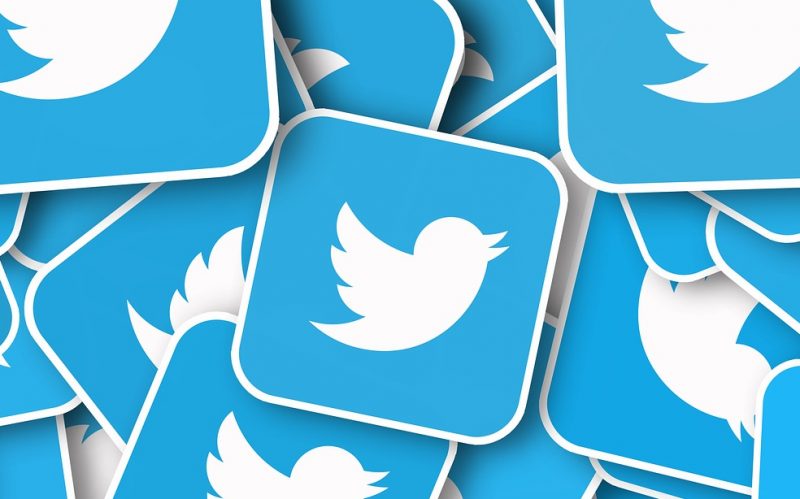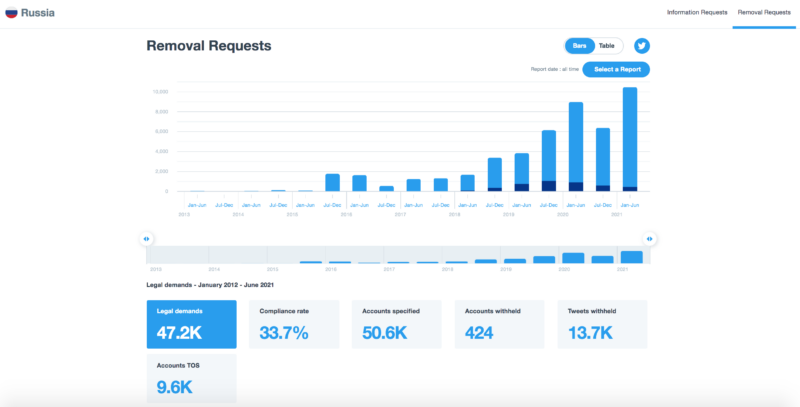 [1]
[1]Image by Gerd Altmann [2] from Pixabay [3], Pixabay license [4].
Microblogging platform Twitter saw record numbers of state requests for content removal in the second half of 2021, according to the company's latest transparency report [5].
During this period, governments around the world submitted 43,387 demands for content removal from 196,878 Twitter accounts – the highest number since Twitter began publishing transparency reports in 2012. These demands were in addition to 12,370 requests for user or account information made by state bodies.
Ninety five percent of the total content removal requests were made by just five countries: Japan, Russia, Turkey, India and South Korea. Twitter uses this metric to account for “legal demands,” which it defines as “a combination of court orders and other formal demands to remove content, from both governmental entities and lawyers representing individuals.”
 [6]
[6]Removal requests from Russia between 2012-2021. Screenshot from Twitter [7].
Japan [8] remained the top requester, accounting for 43 percent of all global requests received. Russia came in second place [7] after Japan and accounted for 25 percent of global takedown requests in January-June 2021.
Russian government entities made 10,448 content removal requests – a record for the country and a 56-percent increase compared to the previous six months (July-December 2020), when Russia submitted 6,351 removal requests. The removal requests included 438 court orders and 10,010 “other legal demands.”
Over two thirds of Russian government removal requests (71 percent) related to content reported by Russia that was alleged to violate local laws against suicide promotion. Twitter partially credits [5] the Russian law with the overall spike in the number of tweets withheld: over 52 percent of all withheld tweets in this reporting period involved content connected to suicide promotion in Russia.
 [9]
[9]Removal requests from Russia in January-June 2021. Screenshot from Twitter [7].
Twitter reportedly complied with 47 percent of Russia's removal requests, withholding 76 accounts and 5,345 individual tweets (making them unavailable to users in Russia), as well as suspending 1,309 accounts (of those mentioned in the requests) for violating the platform's own terms of service.
The microblogging platform also noted [5] a continuing trend of states targeting the accounts of verified journalists and news outlets. Though in the first half of 2021 there was a 14-percent decrease in accounts targeted with removal requests since the previous report, 172 accounts of verified journalists and news outlets from around the world were subject to 231 removal requests, including 40 legal demands from Russia. Of the total 11 withheld tweets by journalists and news outlets, eight tweets were withheld in Russia for containing information about methods of committing suicide and one tweet for sharing extremism-related content.
Sinead McSweeney [10], Twitter's vice president of global public policy and philanthropy, said [11] in a statement:
We're facing unprecedented challenges as governments around the world increasingly attempt to intervene and remove content. This threat to privacy and freedom of expression is a deeply worrying trend that requires our full attention.
Twitter has faced government pressure, fines and censorship in Russia over accusations of failing to remove content deemed illegal, including posts relating to unsanctioned mass rallies and protests. In March 2021, Russian censors began [12] throttling Twitter loading speeds using DPI (deep-packet inspection) equipment operating as part of Russia's new “sovereign internet” strategy. At the time, Russian state media and internet regulator Roskomnadzor said [13] the platform could be fully blocked in the country if it did not “satisfy the demands of Roskomnadzor, and the requirements of Russian legislation.”